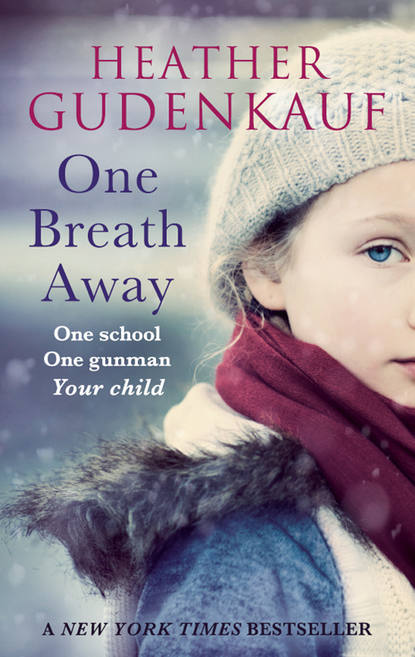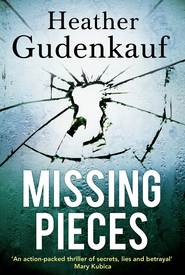По всем вопросам обращайтесь на: info@litportal.ru
(©) 2003-2025.
✖
One Breath Away
Автор
Год написания книги
2018
Настройки чтения
Размер шрифта
Высота строк
Поля
“Smart kid,” he answered with a bitter smile.
Meg
I assure Dorothy that we will look into the possibility that Blake could be the one in the school and send her on her way with the order to call me if she hears anything from her son. Already I’m frustrated. We don’t have enough personnel to chase down all the leads that are forming and the weather is growing worse by the minute.
My phone buzzes again. Another text message from Stuart. I read his latest text first. Come on, Meg. For old times’ sake. Just one comment? I shake my head and snap my phone shut without reading the first message. I already know what it says. Stuart would do anything to get the inside scoop on a story, even resort to blackmail, and the intrusion at the school could be the biggest of his career. Up until the Merritt case, Stuart’s investigative reporting in Afghanistan while covering the war a few years ago was the peacock feather in his cap and earned him the Pritchard-Say Prize for Investigative Journalism. Then there was the Merritt story, which was, besides the whole married thing, the decisive nail in the coffin that was our relationship. Now Stuart is back. He can’t resist the scent of a big story and this standoff. I could see Stuart relishing the thought of a Columbine or Virginia Tech–type massacre just for the byline he would get.
By the time I’ve circled the school with the police line tape, the chief has called in our other off-duty officers and our reserve officers, townspeople who have gone through eighty hours of training and forty hours of supervised time with our small police force. The only time I remember our reserve officers being called in was a few years ago when a tornado ripped through the town of Parkersburg and we were asked to assist. The fact that the chief has requested them tells me this is the real thing.
A large crowd has gathered in the main parking lot. I fill in Chief McKinney on what Dorothy has told me and he digests the information silently.
“Any new info on your end?” I ask him.
“Nothing of use besides the man who phoned and said he is in the school and has a gun.” He shakes his head, releasing the snowflakes that had settled in his hair. “Besides that, we have lots of information that only makes things even more confusing. I swear to God, why the hell are cell phones allowed in school? You’d think that we’d get good solid information from inside, but all they’ve done is jam up the phone lines and cause otherwise sane people to go crazy.”
“No one has seen anything?” I ask in disbelief. “We don’t know why he’s in the school, what he wants?”
“From the calls we’ve got from within the school, here’s what we know.” McKinney pulls off a leather glove and ticks the points off on his fingers.
“We’ve got one gunman. We’ve got three gunmen. We’ve got a man with a machete, we’ve got someone—can’t tell if it’s a male or female—with a bomb. We’ve got shit, that’s what we’ve got.” McKinney runs his hands over his mouth and his icy mustache crunches beneath his fingers.
“We just wait it out, then? We don’t go in?” I ask, already knowing the answer.
“We do just what we’re doing right now, containing the scene and falling back. If we can communicate with the suspect we can get those kids and teachers out safely. It’s this weather I’m worried about,” McKinney says, looking up at the iron-gray sky. I do the same and instantly my vision becomes blurred as snowflakes fill my eyes. “Interstates and highways all over the state are already closed. I’ve called in all the off-duty and reserve officers and dispatchers, and asked Sheriff Hester to bring in his off-duty folks. I’ve got them covering each corner of the building.”
I look to where he’s pointing and see the sheriff’s deputies walking around with M4s slung across their backs. “You think we’re going to need a tac team?” I ask. A tactical—or tac team, as we call it—is a group of officers that comes from all over the state and are specially trained to respond to situations like this.
“Looks that way,” McKinney says. “But if it keeps snowing like this, we’re not getting one. We’re the tac team.”
I see movement through one of the main office windows and place a hand on McKinney’s arm. “Look,” I say, peering through the veil of snow and touching my sidearm like a talisman.
Augie
The cold from the floor is seeping through my pants and it feels as if we have been sitting here forever, but it’s only been like half an hour. All I can think about is that after all that’s happened, I’m not going to be able to see my mom. We’re supposed to get on a plane to Arizona tomorrow and spend the week there.
I wonder what she looks like now. The last time I saw her, her hands were all bandaged up, her hair was all frizzled and her face was bright red like she’d taken a walk in the desert without her hat. Her eyelashes were gone and the nurses had rubbed a thick, shiny lotion all over her arms. P.J. and I talk to her every night, but usually for just a minute or two. She’s too tired or drugged-up from pain medication to talk for very long, but mostly I think she just sounds sad. I know she feels terrible that P.J. and I had to go away, especially to Broken Branch, which she always told us she spent the first seventeen years of her life hoping to leave.
From somewhere outside the classroom we hear banging and a crashing sound and I’m sure he is coming our way. Next to me Beth covers her ears with her hands and begins rocking back and forth and I put my arm around her shoulders. I don’t know what’s going on with Beth. She is the tomboy of our class, the one to go four-wheeling and deer hunting, and now she’s just a mess.
“I’m getting out of here,” Noah says. He stands up and moves toward the windows.
“Sit down, Noah,” Mr. Ellery says strictly.
“No way,” Noah answers, trying to make his voice tough, like he’s some sort of badass. But the words come out so squeaky that I almost feel sorry for him.
“Noah, sit down. If someone’s out there he’ll go right on by us if we’re quiet. The door’s locked. He can’t get in.”
“Like a fricking gun can’t shoot its way through this door,” Noah snaps back, and tries to open a window that leads out to the teacher’s parking lot. Another crash echoes through the hallways and there’s the tinkle of breaking glass and far-off shouts and Noah drops to the floor. If I wasn’t just as scared as he was I would have made a crack about it. For a minute the only sound is everyone’s heavy breathing and Beth’s teeth chattering together.
“Who do you think it is?” Drew whispers in my ear. I shake my head. I can’t speak. Beth pulls on my sleeve and I look over at her.
My dad, she mouths at me, and then covers her face with her hands.
Mrs. Oliver
Mrs. Oliver kept turning around in her seat to see how her children were doing. Most were holding it together, sitting quietly, but she was especially worried about Lucy Shelton, who had some autistic tendencies and didn’t adapt well to changes in her schedule. The buses were due to arrive at one-twenty, two hours earlier than usual, marking the beginning of their spring vacation. It didn’t appear as if their captor was anywhere near done with them and one-twenty was drawing closer.
She was also concerned about Wesley, who had a bladder the size of a thimble. The closest bathrooms were just outside the doorway but it was highly doubtful that he would allow the children to leave the room. Each time she twisted in her seat to check on her charges the man snapped at her to face front. Now I know how Bobby Latham felt, she thought wryly. Bobby had the most severe case of attention deficit disorder that she had ever encountered in her forty-three years of teaching and she had seen a lot. Bobby, face the front, she repeated over and over until she finally gave up and gave him a seat in the back of the room where he could stand, turn around, do cartwheels if he had to, just as long as he didn’t distract the other students in class. This was long before ADHD medication such as Ritalin and Strattera were being prescribed like candy. Oh, she had come to appreciate the effect the medications had on her students with attention concerns, but she didn’t like the way some teachers and parents felt as if it was the perfect panacea. Drug the kid and move on. It wasn’t like that. Students like Bobby needed to learn strategies that helped them focus, tips to be more organized. The medicine just slowed down their brains long enough for their teachers to help give them those real-life skills.
Mrs. Oliver took a deep breath, trying to slow down her own brain. She often used such relaxation techniques with her students, before spelling tests or before they began the dreaded Iowa Test of Basic Skills. Now she was beginning to doubt the effectiveness of the strategy she had so emphatically pressed upon her students. She felt panic blooming in her chest, felt her heart pounding so hard that she thought the beads embroidered on her jumper were going to burst from her chest. She tried combining her deep breathing with thoughts of Cal. Cal always had a calming effect on her.
Surprisingly, Mrs. Oliver wasn’t always Mrs. Oliver as most had come to believe. For the first seventeen years of her life, of course, she was Evelyn Schnickle. Then she became Mrs. George Ford.
George was just her height, was handsome and funny and had the most beautiful green eyes. He was the first boy Evelyn had ever kissed and she decided the minute that his lips touched hers that this would be the man she would marry. They were married the weekend after they graduated high school on a rainy June afternoon. At the reception George teased her that the only reason she married him was to shed her last name. And while she agreed that Evelyn Ford sounded so much better than Evelyn Schnickle, that was certainly not the reason she married him and she glanced daringly downward, causing poor George to blush. Two months after George and Evelyn were married, George was sent off to Vietnam and Evelyn lived with George’s parents in Cedar Falls and enrolled in the teacher’s college there. Three months later, two uniformed soldiers showed up on the doorstep with the message that her new husband had died at Plei Mei along with one third of his battalion. Upon hearing the terrible news, Evelyn threw up all over one of the soldier’s shiny black shoes, which she tried to clean up with the elder Mrs. Ford’s favorite afghan. So after a mere five months of marriage, at the tender age of eighteen, Evelyn was a widow. And pregnant.
Evelyn didn’t know how to be a widow; she hadn’t even had time to figure out how to be a wife. She cried, in private, of course, for the loss of George. She couldn’t sleep thinking about him dying all alone in a steamy jungle. Her in-laws were touched by their new daughter-in-laws’s obvious heartbreak and did their best to comfort her. They told her she was welcome to stay with them as long as she needed. That was the thing, though; she thought she would go absolutely insane if she had to stay with the Fords any longer than she had to. She felt suffocated by the sadness in the house and, if she was honest with herself, terrified at the thought of becoming a mother.
All that changed when she met Cal Oliver. Now forty-five years later, she wondered if this time it would be Cal being visited by a man in uniform, a police officer, telling him that his spouse was dead. Killed by a crazy man with a gun in the middle of March in a snowstorm in a classroom in a small town in Iowa. Who would have dreamed this was the way she would go? She assumed she would die of a stroke like her father or of breast cancer like her aunts had. Not by some murderous cretin. She wondered if Cal would cry and sniffed at the thought of him being dry-eyed at her funeral. Of course he would cry, though; he was the emotional one. She wondered how he would tell their children. He was so bad on the phone. Whenever she stuck a receiver in his hand his power of speech would disappear. The man could talk for hours to someone in the same room with him, but not through a phone. “I like to see their faces when I talk to them,” he tried to explain. Evelyn just clucked her tongue at him and snatched the phone right back from him. She regretted that now, the way she could be impatient with Cal. If she got the chance she would do things differently. She would never nag at him about the way he would walk into the kitchen, reach into the cupboard and grab a box of crackers or cereal and walk away leaving the cupboard doors wide open for someone to crack their head on. She wouldn’t gripe about how fastidious he could be about keeping the garage clean and orderly but couldn’t throw away even one piece of paper without agonizing over it.
No, Mrs. Schnickle-Ford-Oliver was not going to die today. She was going to go home this afternoon, kiss her husband. Hard. Call her children and grandchildren, then change out of her rainbow-studded dress.
Will
Climbing into his pickup truck, Will wondered if he should call Marlys to let her know that something was happening at the kids’ school. He quickly nixed the idea. He had no idea what was going on, knew that Marlys would have a load of questions that he could not answer and then she would be left with the burden of whether or not to tell Holly. No, that wouldn’t be fair. There was nothing that Marlys could do way over in Revelation, Arizona, to help this situation. Her job was to take care of Holly, who just couldn’t seem to catch a break. The latest setback was an infection that somehow seeped into her bloodstream even though she had been pumped full of antibiotics the minute she arrived at the hospital. No, Will wouldn’t say a word about the goings-on at the school until he had solid information and even then he might not mention it. Marlys was exhausted, Holly needed to concentrate on getting better and worrying about P.J. and Augie wouldn’t be beneficial. Instead, he called his son Todd, whose wife was the fourth-grade teacher at the school.
“I’m already here,” Todd said when Will mentioned he was on his way and would meet him in front of the school.
Broken Branch School was a twenty-minute drive over gravel and county roads and Will made the trip in just less than twelve. As he pulled into the school parking lot he could see that a crowd had already formed. Inaudible shouts rose from the pack and were swept away by gusts of wind. Will looked down at his Mossberg on the seat next to him, trying to decide whether or not to bring it out with him. His cell phone erupted in a mind-numbing thrum of rap music that Augie programmed in as his ringtone. She thought it was hilarious whenever a torrent of curses set to music would explode from his phone in the middle of dinner or worse in public at the café or the grocery store. “Dammit, Augie,” he would say, pressing frantically at the buttons, trying to silence the phone.
“What?” Augie said innocently. “You say those words all the time.”
P.J. would nod his head gravely in agreement. “You do,” he would say.
“Hello,” Will barked into the phone.
“Will?” came the timid reply, so unlike Marlys. “Are you okay?”
“Fine, fine. How are you? How’s Holly?” Will asked, looking through the windshield at four of the Broken Branch police officers trying to manage the growing crowd.
“She still has a fever and isn’t eating,” Marlys explained in a trembling voice. “How’re the kids?”
“Fine, fine,” Will said again. “P.J. has been a big help with the calving. He’s a natural cattleman.”
“And Augie?”
“Augie’s …” Will couldn’t bring himself to say anything negative about his granddaughter when he had no idea as to her safety at this moment. “Augie is trying,” he finished. Which was true. She had even joined him and P.J. in the barn the other day where number 135, a gorgeous Hereford with a shaggy red-and-white coat, was giving birth. Augie watched in awe as the calf dropped from his mother’s uterus, slick with afterbirth but undeniably beautiful.
“Ohhh,” Augie breathed, getting caught up in the excitement, her eyes shining, a smile appearing from her normally glowering face.











